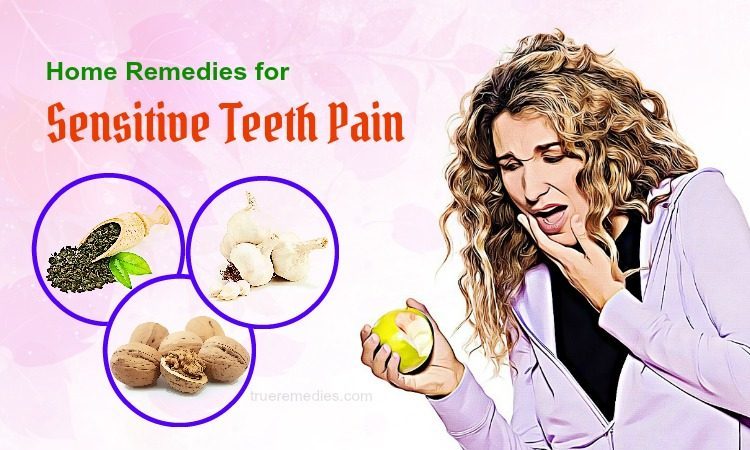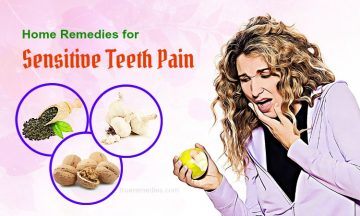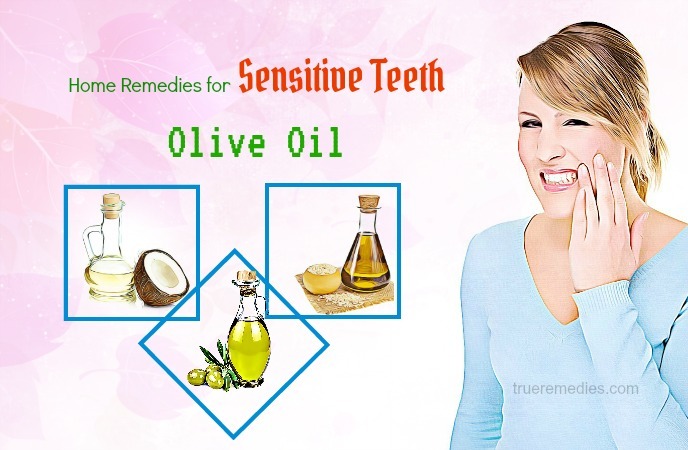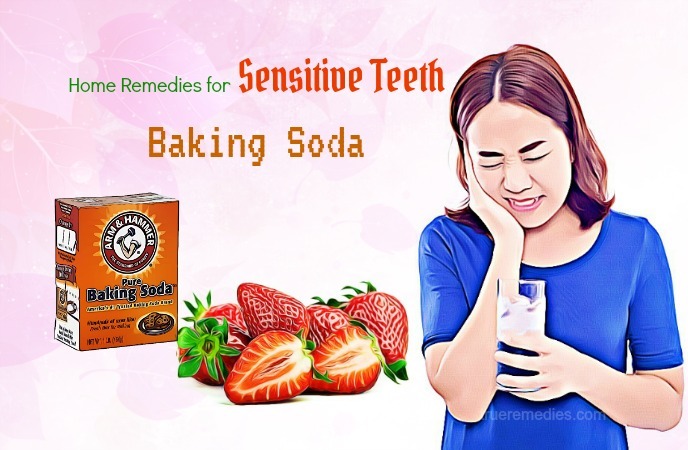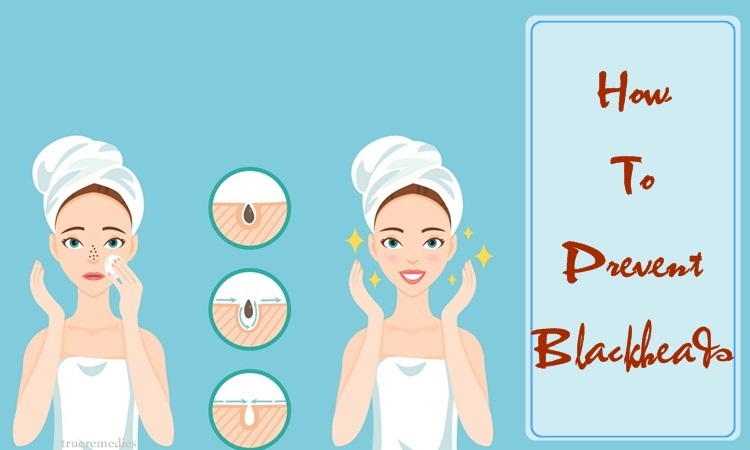Updated: 07/26/2019
CONTENTS
Sensitive teeth are a common dental problem. This condition may progress over time, and it is the result of common problems such as gum recession and tooth enamel worn. Most patients are between the ages of 20 and 50. Sensitive teeth begin to form when the soft dentin located inside the tooth is being eroded. The dentin is under the glaze and gums. Once the dentin is corroded, external agents (such as cold drinks) may stimulate the nerves inside the teeth and causes sensitive teeth.
Are you worried about this disease? Have sensitive teeth often make your life more difficult? Are you worried about how to prevent or treat sensitive teeth? Do not worry, the following article will help you. These measures are very simple, effective. They can be done right at your home. However, before that, let’s learn some necessary information about this disease to get the best view on it and also help you determine the condition of your sensitive teeth to have the most appropriate treatment.
What Is Sensitive Teeth?
Sensitive teeth are a form of dental disease. The most apparent manifestation is the feeling of sensitivity when eating foods, drinks too hot, too cold, or too sour. A healthy tooth will have a structure that includes enamel, dentin, and gums that surround it. After a long period of being affected by harmful elements, the enamel gradually becomes thinner and thinner, and therefore, the protection function of the dentin is reduced considerably. Then, the dentin will be stimulated by temperature or some of the hot, cold, sour, sweet nature, causing a sensation.
What Are Common Causes Of Sensitive Teeth?
Sensitive teeth may be caused by several causes, among them, the most common are:
- Gums recession due to aging or improper brushing.
- Acidic drinks (such as soda) damage tooth enamel and exposed dentin.
- Teeth grinding – this is the cause of tooth sensitivity in most cases.
- Brushing with toothpaste that has abrasives, improper brushing or brushing more than three times a day may cause enamel loss.
- Gum disease may cause gum recession.
- A broken or scratched tooth may expose dentin.
- Some dental measures may be sensitive. Measures such as teeth whitening, tartar shaving, braces, or fillings may cause sensitivity during or after the procedure.
- Due to dental disease: Dental caries decay tissue tempestuously that it may expose both dentin and canal. Then, pathological complications do not stop at the sensitivity but very painful. Gingivitis is also a disease that causes the gums to reveal the root of the tooth.
- Oral hygiene is not guaranteed: Residual food residue is often deposited on the teeth, adjacent to the gum line, which will form plaque containing bacteria. These bacteria will make the gums to peel and remove the bone to reveal the root.
What Are Symptoms Of Sensitive Teeth?
The most noticeable symptom of sensitive teeth is that teeth are very sensitive to foods and may feel pain in the teeth. Sensitive symptoms occur as follows:
TrueRemedies Partner Solutions

Need a Help from the Leading Expert Online, Available 24/7?
They’re all here and ready to answer your questions online or by phone. Keep asking questions until you get the answer you need.
- Feeling a sharp pain when brushing your teeth even when brush slightly. It also appears when chewing.
- Feeling a sharp pain when suddenly contact with too hot or cold food and water.
- Feeling sensitive when eating pickles, spicy, salty, even too sweet.
Thus, when exposed to the effects of temperature, external force, patients with sensitive teeth are feeling sensitive. The degree of severity depends on the degree of dentin recession.
Who Is At Risk Of Sensitive Teeth?
People at risk of sensitive teeth are those who usually eat spicy foods or acidic foods. People who suffer from grinding are often the most susceptible to sensitive teeth. In addition, older people are also at risk of sensitive teeth.
When To See A Doctor?
In cases where you have serious pain or recession, you should see a doctor for a direct examination and counseling. If you have symptoms of sensitive teeth, but the application of the methods we are discussing below does not work, you should see a doctor. The remedies below only help improve the situation if you use it with standard practice for a long time. However, if teeth become sensitive due to tooth decay, cracking, or inflammation of the pulp, you need to seek medical attention and treatment in time.
In addition to the symptoms mentioned above, you also fall into a state of stress, fatigue, tooth loss, you must see the doctor/dentist immediately.
There, you have discovered some information about sensitive teeth. To overcome this condition, many people come to see a doctor. However, if you want to prevent this disease or your condition is not too severe, you can apply the home remedies we mention below. It is time to find out what the best remedies for sensitive teeth are.
After reading this article, please visit our Home Remedies Page to see more effective home remedies for other diseases.
Top 27 Effective Natural Home Remedies For Sensitive Teeth Pain
1. Garlic
This is the first remedy in the list of top 27 natural home remedies for sensitive teeth. According to many studies, garlic contains a lot of allicin antibiotics that help defend against viruses. Garlic oil contains many components of glucose, allicin, and phytonite which may be used to kill bacteria and work as antiseptic and anti-inflammatory properties. Along with that, when crushed with fresh garlic, diallyl disulfide, diallyl-trisulfide, and other sulfuric substances will help suppress more than 70 bacteria. It is also a natural anesthetic[1] [2] [3].
Combining these characteristics will create magic in the treatment of sensitive teeth.
Method 1: Garlic
To apply this method, please follow these steps below:
- Prepare the amount of garlic
- Garlic peeled and crushed
- Then rub on the area be sensitive for three minutes.
Allicin and fluoride in garlic will help you get rid of feeling sensitive after 1-2 days.
Method 2: Garlic And Salts
To apply this method, please follow these steps below:
- Prepare one dry garlic, a little salt
- Crush dried garlic and mix with some salt
- Then add salt and garlic crushed to the position of sensitive teeth
Persistently done every day you will relieve toothache and heal the infection. Chewing a garlic clove each morning will help your teeth stronger.
Method 3: Garlic, Salts, And Ginger
For faster and better sensitive teeth treatment you can apply the treatment of dried garlic, salt combined with fresh ginger because ginger contains terpenes, oleoresin, and zingiber, this is a kind of effective pain medication[4].
To apply this method, please follow these steps below:
- Take one dry garlic peeled, then crushed with a little salt
- Ginger shaved off the shells and crushed
- Take two types of material to fill the teeth
Persistently do this method every time per day, you will see the effect of rapid pain relief.
2. Green Tea
Among home remedies for sensitive teeth, using green tea is one of the most effective. Antioxidants of catechins in tea may help fight inflammation and inhibit the growth of plaque, thus helping to protect teeth and gums[5]. In addition, green tea also works against two types of bacteria that are streptococcus mutans and lactobacillus, which are thought to be associated with cavities and gum disease[6]. Green tea also contains fluoride that protects the enamel. Scientists have also discovered that green tea is effective against tooth decay, even if you add a little sugar to tea[7] [8].
Method 1: Green Tea
All you need to do are: Use green tea leaves by chewing a few leaves of green tea for five minutes then rinse your mouth with clean water to help prevent bacteria, reduce the sensitivity of teeth quickly. With tips to treat the sensitive teeth by using green tea leaves, you should do 2-3 times a day to be able to reduce the sensitivity of teeth as quickly as possible.
Method 2: Green Tea And Toothpaste
To apply this method, please follow these steps below:
- Prepare 100gr green tea leaves, a little toothpaste
- Green tea leaves washed, crushed
- Mix the green tea leaves grinded with toothpaste
- Use a brush to brush both the inside and the outside of the teeth. Not only the anti-sensitive effect but green tea also will help your teeth are bright up every day.
With excessive green tea, your teeth will have a chance of decreasing whiteness and damaging your enamel. The frequency of teeth whitening three times a week with green tea is reasonable.
3. Walnuts
The next home remedies for sensitive teeth is walnuts. Walnut is good for use to reduce irritated teeth. The inner layer of walnuts is rich in linoleic acid, calcium and phosphorus, which help reduce the irritation to the dental nerves and improve the teeth’s health[9] [10]. Walnut shells contain antibacterial biological activity, so it is often used to remove plaque or treat bleeding gums symptoms.
Method 1: The Inner Layer Of Walnuts
To apply this method, please follow these steps below:
- Gargle with salt water
- Chew 20 grams of walnuts in 3-5 minutes and then slowly swallow
You should chew walnuts twice a day to make the best effective
Method 2: Walnut Shells
To apply this method, please follow these steps below:
- Prepare 250 ml of water and 40gr of walnut shells
- Boil the walnut shells in water for 20 minutes
- Then remove the shell and wait for the liquid cooling
- Before brushing, soak the brush in a liquid made by walnut shells for 10 minutes
Brushing your teeth three times a day will help your teeth clean and reduce sensitivity.
4. Coconut Oil
Not only is it beneficial for skin and hair, but recent studies have also shown that another significant effect of coconut oil is to reduce sensitive teeth and improve oral health[11]. The special constituents of coconut oil are capable of eliminating streptococci that is one of the bacteria causing acids to destroy human enamel.
In addition, coconut oil also has the potential to inhibit the growth of the Streptococcus, a bacterium that causes tooth decay[12].
Method 1: Coconut Oil And Toothpaste
To apply this method, please follow these steps below:
- Use two tablespoons of coconut oil, one tablespoon of baking soda and regular toothpaste
- Mix them to make a new toothpaste and then brush your teeth with this mixture
- Then rinse your mouth with cold water
You can use this method to brush your teeth every day, after a few weeks, you will feel distinctly different with whiter teeth.
Method 2: Coconut Oil
You can also use coconut oil to gargle, remove plaque in the teeth.
To apply this method, please follow these steps below:
- After brushing your teeth cleanly, take 2-3 tablespoons of coconut oil to rinse your mouth.
- Having a sufficient amount of pure coconut oil, you rinse your mouth thoroughly from left to right and from the inside out in the oral cavity.
- Rinsing your mouth with pure coconut oil for 15-20 minutes, you will feel the oil diluted with saliva. Then remember to rinse your mouth with clean saline to remove the viscous substance in coconut oil and the tongue to further eliminate the microorganisms that are left in the oral cavity.
Method 3: Coconut Oil, Xylitol, Baking Soda And Peppermint Oil
To apply this method, please follow these steps below:
- Prepare one tablespoon of coconut oil, 1-2 tablespoons of xylitol, one tablespoon of baking powder and a few drops of peppermint oil
- Mix all ingredients above, stir well
- Apply this mixture directly to the brush as you would normally
This method will help to clean and prevent bad breath and reduce sensitive teeth.
5. Olive Oil
Olive oil is the traditional Mediterranean plant. Olive oil is not only used as a raw material for cooking, beauty for the skin, hair, etc. but also the best material to help your teeth whiter and healthier. In olive oil contains a lot of vitamins like A, D, E, F, K, etc. which are used to neutralize fat and antioxidant, so it may be absorbed and help the body to digest the best. In addition, olive oil may help remove toxins from the teeth and gums, removing food debris, and eliminate sensitive teeth[11] [12].
Method 1: Olive Oil
To apply this method, please follow these steps below:
- Just use a clean cloth, soft towels, etc. dipped in pure olive oil solution
- Then use this cloth rub on the tooth surface as lightly as conventional brushing in about 4-5 minutes
- Then you can brush your teeth again with regular toothpaste
If you do not want to brush your teeth with olive oil, you can use pure olive oil to make gargling directly. This not only helps to whiten teeth but also cleans your throat and your oral cavity. Rinse in about 5 – 10 minutes in all directions in the oral cavity and throat.
Method 2: Olive Oil, Coconut Oil, And Sesame Oil
This is a mouthwash by mixing olive oil with coconut oil or sesame oil at a ratio of 1:1:1. Every morning, before you brush your teeth or eat anything, you should pour this oil mixture in your mouth. Gently rinse and push the tongue back and forth between the teeth with the mixture of oil inside. If you feel you are about to swallow the oil, try to regain your breath and do not spit it out. You rinse like that from 5 to 15 minutes slowly in all directions in the oral cavity.
6. Clove Oil
Clove contains a very powerful chemical anesthetic called eugenol. Eugenol is not just an anesthetic; it also causes numbness and reduces pain. In addition, it has antiseptic properties and helps kill bacteria to minimize tooth infection. Clove oil is a powerful anesthetic. It has been used by many dentists for many years. But you should still use clove oil carefully[15] [16].
Method 1: Clove Oil And Water
Clove oil has a strong antiseptic effect, so you should not apply the oil directly to your teeth or gums because it is easy to cause injury.
To apply this method, please follow these steps below:
- Prepare 200ml of clove oil with 200ml of water
- Mix this mixture
- Use the mixture to rinse your mouth
- Then rinse your mouth with clean water
Method 2: Clove Oil And Olive Oil
All you need to do are: Mix clove oil with olive oil, in a 2: 1 ratio. Then take the cotton ball to dot this mixture and apply on the teeth and gums around. This will reduce sensitivity.
7. Salt Water
This is considered as one of the most basic home remedies for sensitive teeth. Salt water is highly antiseptic and is effective in temporarily reducing tooth sensitivity because salt has an inflammatory effect[17] [18].
The way to do this treatment is very simple: Rinse your mouth with salt water when it is sensitive for five minutes and rinse your mouth with clean water. Rinse your mouth with salty water regularly will help clean your mouth and avoid sensitive teeth.
8. Aloe Vera
Aloe vera contains propolis, anthraquinones, and saponins which kill bacteria, promote healing and wound healing[19]. In addition, aloe vera leaves contain many nutrients such as B vitamins such as B12, 19, essential amino acids, vitamin C, E and minerals such as Iron, Calcium, Lecithin, Magnesium, Sodium Potassium, Manganese, and Zinc which are incredibly effective in sensitive teeth treatment. This is one of the natural nutrients that work great in reducing sensitive teeth and safe for health[20].
Method 1: Aloe Vera
To apply this method, please follow these steps below:
- Prepare a branch of aloe vera.
- Wash aloe vera and cut into small pieces and take the gel inside.
- Take the gel inside the aloe vera to scrub to 2-3 minutes.
- Then rinse your mouth with clean water.
- You can do this before brushing your teeth or after brushing your teeth and remember to rinse your mouth with clean water.
Use this method regularly twice a day, and in 1-2 weeks, you will see the unexpected effect.
Method 2: Aloe Vera And Baking Soda
This method is time- consuming but effective.
To apply this method, please follow these steps below:
- You wash aloe vera cleanly and take the gel of the aloe vera
- Then mix the aloe gel mashed with baking soda to form a new substitute of toothpaste
- You use this mixture to brush your teeth as usual
You should only use this method 2-3 times a week to have the best result.
Method 3: Aloe Vera And Honey
With honey combined with aloe vera, you will have an effective method to soothe sensitive well and also prevent and support oral heat treatment.
To apply this method, please follow these steps below:
- Prepare one branch of aloe vera and two tablespoons of honey.
- Wash aloe vera, cut and remove gel inside aloe vera.
- Mix the gel of vera just got with two teaspoons of honey.
- Use the mixture on to brush your teeth.
- Then rinse your mouth with clean water.
9. Baking Soda
Sensitive teeth are caused by broken enamel. Sensitive teeth treatment with baking soda will increase the pH balance and relieve tooth sensitivity by fighting oral pathogens[21].
Method 1: Baking Soda
To apply this method, please follow these steps below:
- Prepare water and 100 grams of baking soda
- Blend the baking soda with water to make a toothpaste
- Use a brush to brush the sensitive teeth
- Leave it for a few minutes, then rinse your mouth with water
If you accidentally swallowed, do not worry, because this is just floating powder. The only downside is that it has no aromatic flavor.
Method 2: Baking Soda, Water, And Salts
This method is very easy but effective. All you need to do are:
- Prepare 10 grams of baking powder, one teaspoon of water, and 10 grams of salt.
- Mix the mixture on and stir well.
- Use the mixture on to brush your teeth from the inside out.
- Leave for 5 minutes and then rinse your mouth with water.
Method 3: Baking Soda And Strawberries
In strawberries containing malic acid may prevent the formation of plaque. Baking soda has a whitening effect, erasing the stain on the teeth. This combination will have the effect of removing stains from food on teeth, especially coffee, wine, coca, or after smoking.
To apply this method, please follow these steps below:
- Prepare 1/2 strawberry and 20 grams baking soda
- Strawberries crushed and mix well with baking soda
- Rub this mixture around the surface and between the teeth
- After about 5-7 minutes, you can brush your teeth with toothpaste
Immediately you will see the shine of the teeth and the reducing of sensitive teeth. Baking powder has a very strong bleach, so you should consider allocating time using a reasonable method depending on your enamel status. On average, you should do 2-3 times a week.
10. Sesame Oil
This is one of the effective home remedies for sensitive teeth. Sesame oil is an excellent source of many wonderful uses in beauty, not only providing beautiful skin, beautiful hair, etc. but sesame oil also helps in decaying teeth treatment, bringing fresh breath and reducing sensitive teeth[11].
The way to do this remedy is very simple:
- Pour one teaspoon of sesame oil into the mouth and rinse through the teeth, from inside out for 20 minutes
- Then rinse your mouth out with water
Just use sesame oil three times a day before meals.
11. Onion
Onion contains a very abundant amount of Thiosulfinates and Thiosulfonates. These are two highly disinfectant ingredients. When used for sensitive teeth, it may destroy harmful bacteria to the teeth and help to remove plaque on the teeth to make teeth whiter brighter, resulting to prevent sensitive teeth[22].
To apply this method, please follow these steps below:
- Use half an onion puree and filter the water
- Put the onion juice in the refrigerator for 1 minute to make onion juice a bit cold
- Using a soft bristle brush to put into cold onion juice. Then brush the teeth from the inside out for about 5 minutes
- Rinse your mouth with water and brush your teeth normally
Do not let onion juice too cold because its temperature may make sensitive teeth.
12. Mint
Mint contains oil, including L-menthol, menthyl acetate, L-menthone, L-pinene, L-limonene and flavonoid[23]. This is the primary determinant of mint treatment for oral diseases such as bad breath, gingivitis which lead to sensitive teeth[24].
Directions: You can get mint leaves to extract water, add salt to the water and gargle. This method helps to kill bacteria, protect dental health, and give you fresh breath all day. Gargle twice every day to have a good effect.
13. Guava Leaves
Flavonoids like quercetin and rutin presenting in guava leaves may help exhibit anti-inflammatory properties. Moreover, they are beneficial for relieving sensitive tooth pain[26].
To use this method, you can follow these steps:
- Wash some guava leaves thoroughly
- Chew them for 1 to 2 minutes and then spit it out
- Repeat this method 1-2 times per day
14. Yogurt
Yogurt is considered as one of the easiest home remedies for sensitive teeth thanks to the benefit of reducing the demineralization of your tooth enamel[27]. It is necessary to consume a ½ bowl of plain yogurt per day.
15. Other Home Remedies For Sensitive Teeth
In addition to the above remedies, you can also take care of your sensitive teeth by the methods below:
- Brush Your Teeth Properly, Using A Soft Silk Brush
If the cause of tooth sensitivity is due to brushing the wrong way, you need to fix it immediately. Use a soft brush, and to brush your teeth properly, use short, gentle movements, paying attention to the gingival lines, brushing the innermost teeth, and the areas around the filling, crowns, and others.
- Gargle With Physiological Saline
Salt water is antiseptic and helps to reduce sensitivity temporarily . Rinse your mouth with salt water in the morning when you wake up and at night before bed.
- Use Flour Toothpaste
Using toothpaste with anti-sensitive ingredients such as fluoride may soothe the symptoms of sensitive teeth[28] [29]. They block dentin neurons, which cause nerves not to be stimulated. Putting a little toothpaste on your finger then massaging it directly onto the stiffened tooth may help reduce the symptoms of sensitive teeth.
- Change Eating Habits
Limit your intake of sugar. Do not eat too hot or too cold, spicy, or salty items as this will increase the sensitivity. Keep away from acidic drinks such as fizzy drinks, lemonade, and more. High fiber foods help build minerals that prevent tooth sensitivity.
Good fiber sources include dried fruits such as dates, raisins, figs, and fresh flowers such as bananas and apples, vegetables such as beans, cabbage, peas, peanuts, fruits, and almonds. In case you do not brush your teeth several times a day, eating an apple is the simplest hint for you.
- Boost Calcium
Calcium is an indispensable ingredient in fighting tooth problems. Dairy foods are an ideal source of calcium, with choices like milk, yogurt, and cheese.
- Take Measures To Resolve Grinding Teeth
If you grind your teeth, let’s use anti-grinding support devices at night.
The above-mentioned natural home remedies are claimed to be able to reduce symptoms of sensitive teeth. Although the home remedies for sensitive teeth are relatively time-consuming and slow-acting, their effects will surprise you. Choose some of them and alternate them in your treating to see how effective they are.
However, all content provided is for informational & educational purposes. We recommend you consult a healthcare professional to determine which method is appropriate for you and to avoid the side effects when applying these methods. In addition, asking for healthcare professional’s advice may help you know that you have to take medicine or not, especially for children, pregnant or breastfeeding women.
If you have any ideas about this article of “Top 27 Natural Home Remedies For Sensitive Teeth Pain”, do not hesitate to drop your words below this post. We will answer as soon as we can.

